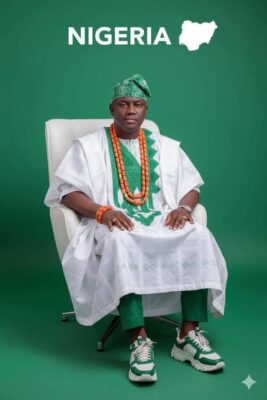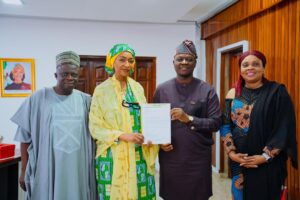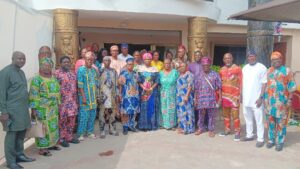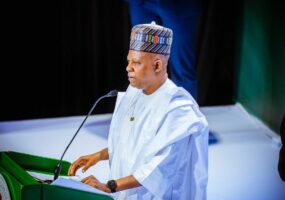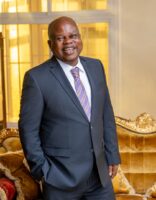The Alaafin of Oyo, His Imperial Majesty, Oba Abimbola Akeem Owoade 1, has called on politicians to eschew primordial sentiments but be more pragmatic in finding solutions to the myriad of problems confronting the country.
He said national growth and development depend largely on the good sense of justice, moral worth and responsibility, conscientiousness, devotion to duty, selflessness, probity and honesty exhibited by the leaders and the led.
In a message through his Director of Media and Publicity, Bode Durojaiye, to commemorate the country’s 65th independence anniversary, Oba Owoade said, as a people, we must also judge our fellow Nigerians not by their ethnic origins but by the content of their characters.
The monarch called for the maximisation of the benefits of diversity to save the country from the precipice of disintegration.
He expressed that politicians must close ranks, logically brainstorm, and arriving at an in-depth and coherent understanding of the contending state-building issues in the country, identifying the fear of the dominance of one state over another, over-concentration of powers, lack of consensus politics and government based on a community of interests, absence of truly integrative national political parties, non-establishment of the principle of public accountability for office holders, and inequitable
system of revenue allocation.
The monarch stated that the lingering issues are not new but immutable, metamorphosed and taken on different and violent characters in today’s national life, adding that the ultimate consequences are that they still pose serious threats to peace and national security.
“As constant variables in our national consciousness, there should be genuine and concerted efforts towards addressing these challenges to peace and security. Nigeria’s ethnic, sectional and religious diversities ought to serve as a source of national unity, cohesion, and integration, but unfortunately, this has over the years.
“A serious threat to peace, security and national development because the Political elites have always tended to manipulate these identities for their parochial interests,” the statement stated.
He went further, ‘’politically, the amalgamation of the Southern and northern protectorates in 1914 brought together people of diverse historical and cultural backgrounds into one political space to chart a new future.
“Despite this obvious challenge of diversity, the commitment of the colonial government towards ensuring the unity was demonstrated in several policies aimed at fostering cultural, political, social and economic ties among the various groups in the new nation.
Thus, from the time of amalgamation of the two protectorates with the colony of Lagos, till the period of regional administrations, Nigeria became committed to a united federation. Its commitment arose from its acceptance of federalism as a particular kind of functional arrangement between diverse communities for living together and working together nationally, whilst preserving a measure of separate entities.
Read Also
” The quantum of unification and the quality of unity achieved were obvious. Education, solid infrastructures, gainful employment, social welfare programmes and sound health care delivery were accomplished by our leaders of blessed memory, Chief Obafemi Awolowo, Dr Nnamdi Azikiwe, and the Sardauna of Sokoto, who fought for the country’s independence.”
Alaafin further stressed that ‘’it is assumed that a nation’s value system is sacred and could extend beyond that nation’s boundaries. All nations are supposed to be proud of their value systems, just as a person is proud of his or her upbringing and character and would try to impress that behaviour and beliefs on others. Basic values are traditional and historic, reflecting aspects of the experience that each nation has gone through since its inception as a nation
‘’Where were those legacies today? Why are things falling apart today? Why is it that public funds spent for the successful running of regional governments by our founding fathers were sourced internally without any external borrowings? Why is it that despite a huge amount of money being borrowed externally by the present-day governments, the lives of citizens are still miserable? Where did we get it wrong? Are our problems, including insecurity and socio-economic duodrums, defied solutions?’’
Oba Owoade reflected on the history of the Old Oyo Empire as the first longest-reigning Empire to operate a cabinet system of government, noting that different sub-ethnic groups and religious groups co-existed peacefully and where ethnic and religious sentiments were subsumed under societal interests.
Alaafin posed a serious question on the issue of religious and ethnic tolerance, asking, ‘’If we are honest with ourselves, we would mostly agree that all is not well with our nation and that the values we once held dearly have gone into oblivion. Where are values like honesty, integrity, good neighbourliness, religious tolerance and so on that once defined our society? ‘’
According to the statement, the monarch charged Nigerians to be wary of political saboteurs, stating that, “Alaafin stated that as people we must be wary of those who are the greedy, selfish political class, and who have continued to exploit our differences to plunder our resources.
This is the reason why we must always see the good in ourselves. It is the reason why we must ignore ethnic chauvinism and primordial sentiments among us.”
The Royal Father encouraged parents to always inculcate in their wards an enduring lesson in the inherent goodness of ordinary Nigerians.
Oba Owoade also advised the present generation of youths not to lose grip on the link that ties them firmly with their tradition and customs.
He said a nation or tribe without customs is as good as a horde of gorillas ravaging the deep forests.

